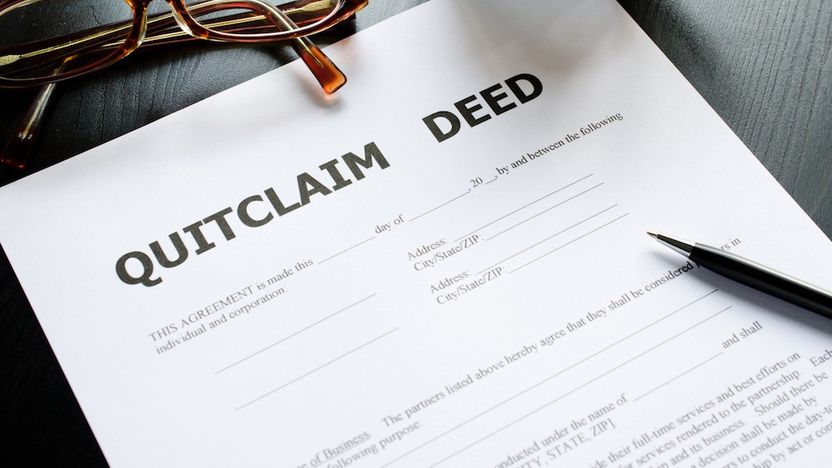A deed is required when transferring real estate ownership to formalize the deal. A deed is a formal legal instrument that transfers ownership of real estate from one party to another.
A quitclaim deed is a sort of deed that is typically used between 2 trusted parties to quickly, but more dangerously, transfer the ownership of a property.
To have a better understanding of the quit claim deed as well as its purpose, you should continue reading this article.
What does a quitclaim deed mean?
An official document known as a quitclaim deed is used to transfer ownership of real estate as well as property from one person to another.
Due to the speedy nature of the transactions, they are frequently termed “quick claim” deeds. When a quitclaim deed is utilized, no title check or title insurance is required, and the property is conveyed in its current state.
What does it do exactly?
A quitclaim deed gives the new owner very little buyer protection while transferring ownership of the property. The grantor, the individual transferring ownership, hands the grantee, the individual acquiring the property, and their current deed. Without any modifications or changes, the title is transferred.

Therefore, if the grantor possesses what would be considered a “poor” title, the grantee will receive it just as it is. As a result, quitclaim documents are frequently utilized within families or to correct a mistake within the original title. Quick claim deeds, quitclaim deeds, as well as quitclaims are all variations of quitclaim deeds.
How does a quitclaim deed operate?
Through the use of a formal contract, a quitclaim deed enables one owner of the property to transfer ownership to another. Making a quitclaim deed form that includes information on the property, the transfer date, as well as the names of the parties trading the title completes the procedure.
You probably know by now that the original owner of the property, known as the grantee, can now sign the deed document to provide possession to the new proprietor, known as the grantor.
Quitclaim deeds typically require notarization and, in some cases, the presence of a witness. The county clerk must then receive the deed for the ownership transfer to be publicly documented. This is typically how the quitclaim deed operates, though the specific steps may differ significantly based on the state where the property is based in.
When should I use a quitclaim deed, and who needs one?
Although there are a variety of reasons for quitclaim deeds, they are most frequently used to divide property between spouses as well as family members. For instance, following a divorce, one spouse might execute a quitclaim deed to formally transfer the title of the property.

Real estate can be transferred into a Living Trust through the use of quitclaim documents in estate planning. Given that quitclaim deeds do not affect pre-existing mortgages, it is frequently crucial to get the Trustee’s approval before transferring real estate into a Trust.
If errors were made during the first transaction, quitclaim deeds could also be utilized to rapidly reissue a real estate title. Examples of common mistakes that can be fixed through the employment of a quitclaim deed include misspelled words as well as titles with missing signatures.
When is a quitclaim deed used?
A quitclaim deed may be practical in the following circumstances:
- Marriage: when you marry, it’s simple to change your title to include your spouse.
- Divorce: if you or your ex-spouse divorce and you need the title transferred.
- Wills: If a person has left the title to either a relative or friend and passes away.
- Gifts: If you desire a simple, affordable title transfer after gifting someone your property.
- Correction of title issues: If the title to your home contains a mistake and has to be corrected.
As you can see, every transfer involves two parties who can be trusted, so the likelihood of a problematic title agreement is typically low. Although they are among the most frequent, these are not the only situations in which you’ll encounter the usage of a quitclaim.
What benefits can a quit claim deed offer?

1. The effective title transfer procedure
A real estate lawyer, as well as an agent, is not necessary when using quitclaim documents to efficiently transfer a title of the property amongst family members.
2. Gift tax advantages
Family members can prevent paying the taxes connected with a standard real estate transaction by using quitclaim transfers, which are frequently considered gifts for tax reasons.
3. Simple to use
The employed forms are simple to comprehend, and frequently only a notary, as well as a witness signature, is needed to legalize something.
4. Can avoid liens with a new owner
Mortgages and tax liens on the property are not transferred via quitclaim deeds. This indicates that the former owner is still liable for the debt outstanding on the property.
5. Property avoids probate
Before the original owner dies, a property might be transferred via a quitclaim deed to avoid going through the probate process. This frequently occurs when a person has a terminal illness or perhaps another health issue.
What drawbacks come with a quit claim deed?

1. There are no transactional protections
A quitclaim deed does not provide benefits for the new owner of the property, in contrast to warranty deeds. There is also no way to ensure that the land is owned free as well as clear, without any encumbrances but rather limitations.
In rare circumstances, the grantor can also be hiding additional information. Unless the deed was fraudulent, the buyer has few options in these situations.
2. Responsibility assigned to the new owner
Before executing a quitclaim deed, the new owner can choose to conduct a title check to safeguard themselves from issues. In essence, the grantee is responsible for verifying the accuracy of the property information before approving the new deed.
Due to these factors, it is suggested that only quitclaim deeds be used when transferring property among relatives or close friends. Since there is no assurance that the former owner has revealed all material facts about the property, a quitclaim document is practically never used during a conventional real estate sale.
Conclusion

I hope this article helped you understand the true purpose of a quit claim deed and can now also help you in making an accurate decision. Quit claim deeds are a common method for transferring real estate quickly as well as effectively between two reliable parties, so it is surely a greater option.






